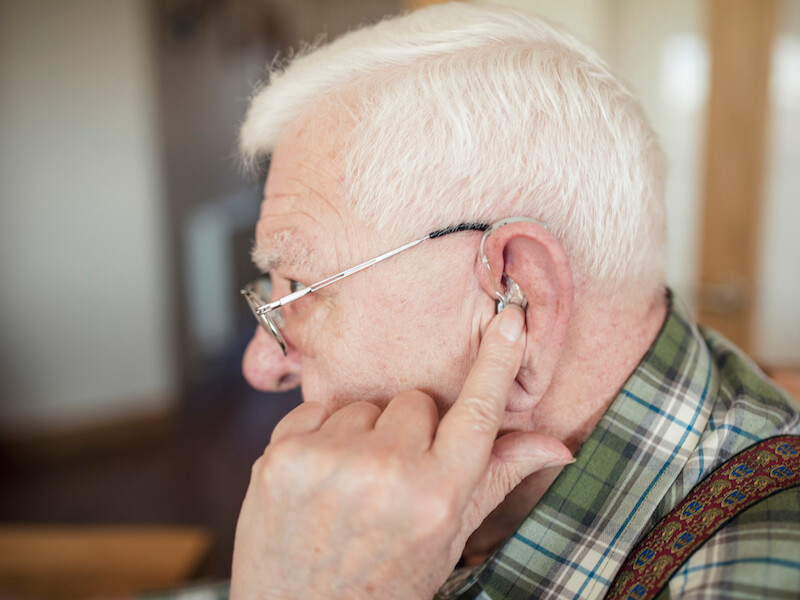
Does it seem like your hearing aid batteries lose their charge too fast? Here are some unexpected reasons that could happen. How long should hearing aid batteries keep a charge? Between 3 to 7 days is standard. That range is pretty wide. So wide, in fact, that it’s unpredictable and puts you in a significant predicament. You may be on day 4 at the grocery store when all of a sudden, things get quiet and you’re unable to hear the cashier. Or it’s day 5 and you’re having a call with friends when all of a sudden you find yourself feeling really alone because you can no longer hear the conversation. Occasionally the batteries don’t even make 3 days. Like when you’re watching TV on day 2 and all of a sudden you can’t hear the show your that’s on. It’s more than a little inconvenient. You just can’t tell how much battery power your hearing aids have left and it’s causing you to miss out on life. If your hearing aid batteries are dying too fast, there are a small number of likely culprits.
Moisture Can Drain a Battery
There aren’t very many species that release moisture through their skin but humans do. It’s a cooling mechanism. It’s the body’s way of purging the blood of sodium and toxins. Moreover, you might live in a rainy or humid climate where things get even wetter. The air vent in your hearing aid can get clogged by this additional moisture and it will be less effective. Moisture can also interact with the chemicals of the battery causing it to deplete faster. Here are some measures you can take to avoid moisture-caused battery drain:
- if your storing them for several days or more, take the batteries out
- Don’t keep your hearing aids in the bathroom, kitchen or other moist environments
- A dehumidifier for your hearing aid is beneficial
- When you store your hearing aids, open the battery door
Advanced Hearing Aid Features Can Deplete Batteries
Modern digital hearing aids help people hear a lot better than ones that you could get just ten years ago. But if you’re not paying attention, these advanced features can cause faster battery drain. You can still use your favorite features. But keep in mind, you will need to change the battery sooner if you are streaming music from your phone for hours. Bluetooth, multichannel, tinnitus relief, noise canceling — all of these added features can deplete your battery.
Altitude Changes Can Impact Batteries Too
Moving from a low to high altitude can sap your batteries, especially if they’re on their last leg. When flying, skiing or climbing always brings some extra batteries.
Maybe The Batteries Aren’t Really Low
Some models will give you a warning when the battery begins to get too low. These warnings are, under normal circumstances, a “heads up”. It doesn’t mean you have a depleted battery. Moreover, sometimes an environmental change in humidity or altitude briefly causes the charge to drop and the low battery alarm gets triggered. In order to stop the alarm, remove the batteries, and then put them back in. The battery might last several more hours or even days.
Improper Handling of Batteries
Wait until you’re about to use your hearing aid to pull the tab from the battery. Make sure you wash your hands before touching your hearing aids or batteries to avoid getting dirt or hand oil on them. Don’t ever freeze hearing aid batteries. This trick may increase the life of some types of battery but it doesn’t work with hearing aid batteries. Simple handling errors like these can make hearing aid batteries drain more quickly.
It’s Not a Good Idea to Buy a Year’s Supply of Batteries
When you can afford to do it, buying in bulk can be a smart idea. But as you come to the end of the pack, the last few batteries probably won’t be at full power. Try to stick with a 6-month supply or less unless you’re okay with wasting a few.
Purchasing Hearing Aid Batteries Online
Buying online can be a good thing. There are some pretty good deals out in cyberspace. But some batteries that you can find online are being sold by less honest individuals and are near their expiration date. Or even worse, it has already passed. So you need to be cautious.
Both alkaline (AA, AAA, etc.) and zinc hearing aid batteries have a date they will expire. You shouldn’t buy milk without checking the expiration. You need to use the same amount of care with batteries. Be certain that the date is well in the future so that you can get the most use out of the pack. If the website doesn’t mention an expiration date, message the vendor, or buy batteries directly from us. Make sure you know and trust the seller.
Current Hearing Aids Are Rechargeable
Hearing aids may drain too quickly for a number of reasons. But you can get more power from your batteries by taking some precautions. You might also think about rechargeable hearing aids if you’re in the market for a new set. You dock them on a charger each night for a full charge the next day. The rechargeable batteries only have to be changed every few years.
